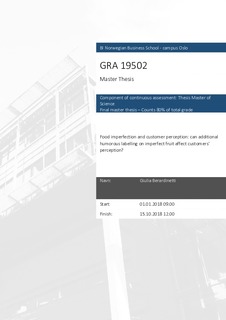Food imperfection and customer perception: can additional humorous labelling on imperfect fruit affect customers' perception?
Master thesis
Permanent lenke
http://hdl.handle.net/11250/2578577Utgivelsesdato
2018Metadata
Vis full innførselSamlinger
- Master of Science [1621]
Sammendrag
The aim of this thesis is to analyze in depth a matter that has been of great
interest in the last 10 years: food waste. After various studies (Elder &
Krishna, 2011; Loebnitz & Grunert, 2014;) that have established that people
waste most of their food due to imperfections in shape, color, size and
packaging, and furthermore, also supermarkets fuel this behavior
(Cicatiello, Franco, Pancino & Blasi,2016), the aim of this research is to
understand if a plausible marketing solution can be found.
Inspired by a French supermarket: Intermachè - who was one of the first
large retailers to promote and advertise imperfect food products- the
research continued in expanding the topic of humorous labelling in literature
and subsequently analyzing potential variables that could influence the
behavior toward imperfect foods like Disgust. Thus, our research question
is: “Can additional humorous labelling on imperfect fruit affect
customers’ perception? For the concept of “customer perception” the
variables Willingness to Purchase and Willingness to Pay were considered.
Four images, of a fictitious supermarket “Paptrita”, were created for the
study, showing: a normal apple, a normal apple with humorous labelling, an
abnormal apple and an abnormal apple with humorous labelling. The
humorous labelling was: “An apple a day keeps the doctor away” for the
normal apple and “An ugly apple a day, still keeps the doctor away” for the
abnormal apple. These images were randomly shown to the participants
through an on-line survey. An in-between subjects two-way ANOVA was
used to study the relation between the means of the different groups and a
further ANCOVA analysis was conducted to control for Disgust and to
compare the different groups.
The results indicate that showing either a normal apple or an abnormal apple
does make a difference for the customer. Normal shaped foods are still
preferred to the abnormal ones, keeping all other things equal. There is no
significant difference amongst the normal apple with or without labelling.
However, when we introduce the humorous labelling on the abnormal apple, we have significant results on Willingness to Purchase and Willingness to
Pay when compared to the normal apple, normal apple with humorous
labelling, he abnormal apple as well as the abnormal apple with humorous
labelling.
Beskrivelse
Masteroppgave(MSc) in Master of Science in Strategic Marketing Management - Handelshøyskolen BI, 2018
